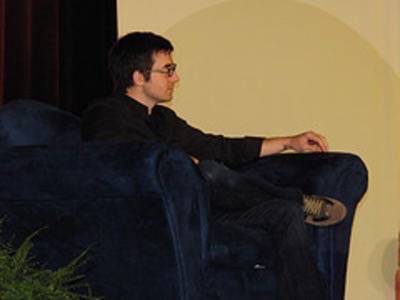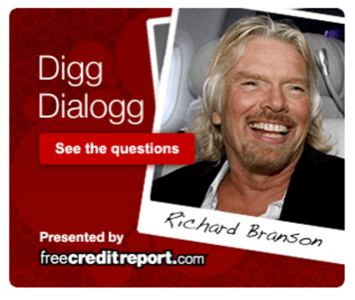Digg, which has spent four years trying to level the playing field and democratize media, will soon receive a facelift. According to Kevin Rose, Digg’s founder and chief architect, the site, which hasn’t changed much since its inception, will be putting a “stake in the ground this year and making some big changes.”

Speaking to the Ad:Tech audience in San Francisco today, Rose talked about Digg’s future saying ads need to be more interactive, print can’t be saved, online publishers are in an incredible position and the importance of power users may be underestimated.
Update: Digg starts rolliing out its own ads
Rose on Digg and Advertising
Digg’s advertising needs have changed. At the beginning, “we had lots of servers falling over,” Rose explained. The deal with Microsoft saved the day, allowing Digg to outsource ad sales while continuing to work on the product. However, Digg is now four years old, and banner ads are no longer enough. It’s ready to build its own sales team, which currently stands at 2-3 and Rose estimates it could grow to 10-15 over the next year.

The site will focus on larger ad campaigns, and according to Rose, turn to its users. “If anything, Digg has users that like voting,’ Rose explained, “and I would love to see a world that if something is really crappy, it gets destroyed or thrown off the site.” Either that, he said, “or we charge people more for crappy ads,” he added with a grin.
While he says he can’t “guarantee” this type of social advertising will make it to Digg, it’s certainly an attractive ideal. Rose explains that Digg is looking at ways that people can engage with ads, “so the second [an ad] goes up, it’s not just about click-throughs; it’s more about watching and seeing what [people] think.”
Social Advertising?
Rose pointed to the Chevy SUV campaign that invited visitors to create and share their own ad copy on video clips. “It’s going to happen,” Rose said, and “I’m happy to push it and make it happen sooner.”
The caveat, of course, is that Rose doesn’t want Digg to be a platform where the only discussion involves comments like “that ad sucks.” “I’d hope [conversation] would be deeper,” he added.
Although he likes the idea of user involvement when it comes to advertising, Rose noted that there are two problems with these forms of social ads; people are generally conservative and scared to expose their brand in that way, also, the tools aren’t there to foster discussion.
But, tools could be coming, and they could be coming to Digg. Last week, in an interview with Mike Arrington, Rose explained that Digg is completely revamping its site and expects it will be seen as a “ballsy move” when unveiled.
Rose on Cool Hunters
Rose, who removed the Top Users list from Digg two years ago, today said that they may soon make a reappearance, but in a different form. “We have these amazing users who have an eye for what the masses will enjoy,” Rose said, and “it’s important to highlight those people because they are valuable.”
“In reality, he said, “they take on what is cool – they’re very good at finding high quality content that other people will enjoy – and I don’t mind [emphasizing] that”
“I think you’ll see us expose that data in the future,” Rose added, saying you’ll likely get to see who the “tastemakers” turn up to be under specific categories.
Note: If you’re interested in seeing Digg top users, Social Blade, which is not affiliated with Digg, maintains a list.
Rose on Dead Tree Media
“Dead tree media is…dead,” said Rose, who believes we are entering a world of the personal brand, much like Gary Vaynerchuck described [video link].
The landscape has changed. “It’s not necessarily about destination site,” Rose continued, like the Wall Street Journal or the New York Times, “it’s about the person writing the article.” Walt Mossberg, for instance, will continue to grow his audience, regardless of where he is published, and Rose sees that as power. “He can move his fans and readers in any direction.”
And with the transformation taking place in the world of media, it’s an important distinction.
Asked whether Digg can help save the newspaper industry, Rose gave a quick, but succinct “no.” Although Digg can’t help save print, Rose believes it can absolutely empower the sites. “We can help them understand where their traffic is coming from and let them know more about their users and what they like.” “And if you know what people like, you can serve better quality ads.”
Whether you’re a blogger working in your basement or a journalist at the New York Times, it makes no difference. If your content is good, it will get noticed by Digg’s cool hunters. Yet not every social site can do this. While many have tried, (Reddit, Mixx, Yahoo Buzz etc.), Digg has always been the leader in consistently leveling the media playing field.
Why Digg? Well, we can’t quite put our finger on it, but as Rose told Arrington last week, “I just feel that we’re heading in a different direction than them.” And at ReadWriteWeb, we agree. What do you think?
Update: It appears Digg is already rolling out is own ads, with the ad below appearing tonight, after the site was taken offline for a couple of hours. This comes not 12 hours after Rose gave his keynote at Ad:Tech earlier today.

Photo Credit: Flickr Affiliate

















